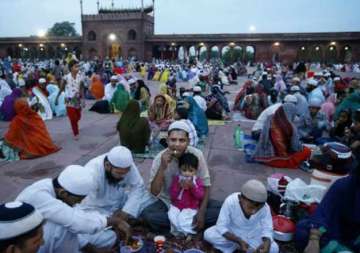10 unknown facts of holy month of Ramzan
Eid( Eid-Al-Fitar), also famous as Mithi-Eid, is the most important festivals of Muslims. The countdown for the festival has started with advent of the sacred month of Ramzan. The devotees observe day long fast or

Eid( Eid-Al-Fitar), also famous as Mithi-Eid, is the most important festivals of Muslims. The countdown for the festival has started with advent of the sacred month of Ramzan. The devotees observe day long fast or Roza for continuous 29-30 days.
Infact, Ramzan is the month when sacred Quran descended on earth. Therefore, Ramzan is just not a month for showing ones' devotion and sacrifice but it's also an occassion for celebration. Ramzan is an Arabic word which literally means scorched earth.
We have come up with 10 interesting facts about Ramzan that may not be known to many people.
1. People excused from observing fast:
Holy Quran excuses pregnant woman, mensurating women and breastfeeding women, physically or mentally ill person for observing fast in the month of Ramzan. Children are not obligated to fast until they reach puberty. Also if one is travelling then he or she is exempted from fast.
2. Different times to break fast for Shia and Sunni.
Sunni Muslims break their fast during sunset after Magrib's Namaz whereas Shia Muslims do not break their fast before complete darkness.
3. How the month of Ramzan is determined.
The month of Ramzan is based on lunar calendar. The lunar cycle moves backwards therefore the festive month typically moves 11-12 days earlier each month.
4. Not just a time for devotion but celebration also.
Although Muslims fast from sunrise to sunset to show their devotion but in many Muslim countries it is rather a time of celebration. After iftaar the roads and bazaars also get coloured in festive mood. People visit each other's home to share their joy. During Ramzan, Muslims are expected to abstain from impurities such as bodily pleasure, cigarette and intended to focus the mind on prayer, spirituality, and charity and to purify the body and mind.
5. Recommended food for iftar.
The Prophet used to break his fast with some fresh dates, if he didn't get any, then dried dates, and failing that too, he would drink a few mouthfuls of water. Date fruit has enough protein that 6-7 date fruits can keep a body fit even after a full day of fast.
Breaking the fast with salt is prefered by some Muslims but its use is debateable among scholars.
6. Ramzan name common for both men and women
Ramzan name was quite popular once, even now it is pretty much common. In India and Pakistan, Ramzan is named after women folks e.g. Ramzan Bi and in other countries male folks are named Ramzan.
7. Even before Islam, Roza was observed
Roza is not Islam's discovery. It is mentioned in Hebrew bible also. According to the bible, when Queen Esther went to meet her husband king for the protection of Jews, she advised the them to observe a fast of three days. Even Jesus Christ observed a 40 day fast in desert.
8. In Arab countries, TV Channles make huge profit during Ramzaan.
During Ramzaan, TV channels of Arab coiuntries get very high TRP which means their earning increases manyfold. In these thirty days channels make programmes that are broadcasted at night.
9. The weight increases even after observing Roza.
It is often seen that the Rozedars ( one who observes fast) weight surprisingly increases after thirty days of Roza, it can be attributed to over eating and consuming oily foods when they break their fast. Another reason is the lack of body movement in these thirty days.
10. Muslims shows thier generous side
During Ramzan, Muslims donate according to their status. Food is offered for iftaar at mosque for poor Rozedars so that they can break their fast.